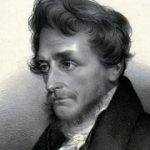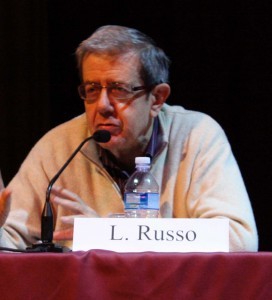Isles of the Blest
Lelewel, Joachim Ignacy

Joachim Ignacy Lelewel (1786-1861) was a Polish historian, geographer and political activist.
He published a number of multi-volume historical works. Regarding Atlantis, he also published a map(a) in 1831[1760] which located Plato’s Island in the Atlantic directly west of the Strait of Gibraltar. While the map only shows lines of latitude, its longitudinal orientation is rather askew. Although it includes a distorted Britain it completely omits Ireland!
However, Lelewel considered Atlantis to be an invention inspired by the ancient stories of the Isles of the Blessed.
Mariani, Bizzi & Facchielli (L)
G.M.S Mariani, Vladimir Bizzi and Bernardo Facchielli are the Italian authors of La Scienza di Atlantide (The Science of Atlantis)[1073]. According to the book’s subtitle it is concerned with the seven major islands of the Sea of the West, which are probably the seven Isles of the Blest, usually identified as the Canaries.
Russo, Lucio
Lucio Russo (1944- ) is an Italian mathematician, physicist and science historian. In his 2013 offering L’ America dimenticata[1060] (The Forgotten America) he bravely suggests that America was discovered by * the Phoenicians or the Carthaginians. He also claims that the longitude of the Lesser Antillies (known as the Isles of the Blest) was known precisely to Hipparchus (190-120BC), but that Ptolemy (90-168AD) later identified the Isles of the Blest with the Canaries and made a catastrophic error when he reduced the circumference of the Earth to 180,000 stadia from the nearly exact figure of 252,000 stadia calculated by Eratosthenes centuries earlier.
* the Phoenicians or the Carthaginians. He also claims that the longitude of the Lesser Antillies (known as the Isles of the Blest) was known precisely to Hipparchus (190-120BC), but that Ptolemy (90-168AD) later identified the Isles of the Blest with the Canaries and made a catastrophic error when he reduced the circumference of the Earth to 180,000 stadia from the nearly exact figure of 252,000 stadia calculated by Eratosthenes centuries earlier.
Having unravelled Ptolemy’s error Russo was then able to locate the position of Thule on the coast of Greenland(a). Jason Colavito had a few critical words to offer regarding Russo’s theory(b).
>Nevertheless, in an interview, Russo defends the central thesis of his L’ America dimenticata regarding early transatlantic travel. In the link below(c) which offers an English translation of the interview, a number of excerpts from his book are also added.<
(a) https://en.wikipedia.org/wiki/Lucio_Russo
(b) https://www.jasoncolavito.com/blog/italian-mathematician-ancient-greeks-discovered-America
Martinez Hernandez, Marcos
Marcos Martinez Hernandez was born in the Canary Islands in 1945. He studied there at Laguna University and later at Madrid University where received a doctorate in Classical Philology. His academic career eventually brought him back to Laguna University where he held the Chair of Greek Philology from 1987 until 1999.
He has written a range of articles and books, with one on possible connections between The Canaries and Greek Mythology[384] including Plato’s Atlantis, Isles of the Blest and the Hesperides.
Atlantides
Atlantides, in Greek mythology was the collective name given to the seven beautiful daughters of Atlas, the founder of Atlantis. They were also known as Pleiades or Hesperides, after their mother Hesperis. As the Hesperides they were considered the protectors of the Seven Isles of the Blest, which contained the Gardens of Atlas, their father. The Garden of the Hesperides was located, according to Eustatius in the field of Atlas.
Hercules had to locate ‘the golden apples’ in the Garden of the Hesperides. Jonas Bergman has identified the ‘golden apples’ as the oranges of Morocco, with a site near Lixus providing the Garden of the Hesperides. *[The late Michael Hübner who was also an advocate for a Moroccan site for Atlantis proposed that the fruit of the Argan tree found in the Souss-Massa region were the ‘golden apples.]*
If these interpretations are is correct, it implies that Hercules was familiar with apples but not oranges and hence he must have come from a more northerly climate; which raises a series of other questions not pertinent to this work.
Isles of the Blest (t)
Isles of the Blest is a term first mentioned by Hesiod circa 700 BC and later in the 5th century BC, a hundred years before Plato, in one of the few fragments we have of a work called Atlantias by Hellanicus of Lesbos. The text relates “Poseidon mated with Celaeno, and their son Lycus was settled by his father in the Isles of the Blest and made immortal.”
Paul Dunbavin has pointed[099] out that Pindar the Greek poet again writing in the 5th century BC also refers to the Island of the Blest in terms that are indistinguishable from his description of the home of the Hyperboreans. Dunbavin has concluded further that Island of the Blest and the Elysian Fields or Elysium are the same place. Andrew Collins supports this idea[072] and adds the possibility that they may also identical with the Fortunate Isles.
Where Dunbavin concludes that the Isles of the Blest were located in what is now the British Isles, Collins favours them as an early reference to the Canaries, Madeiras or even Azores.

